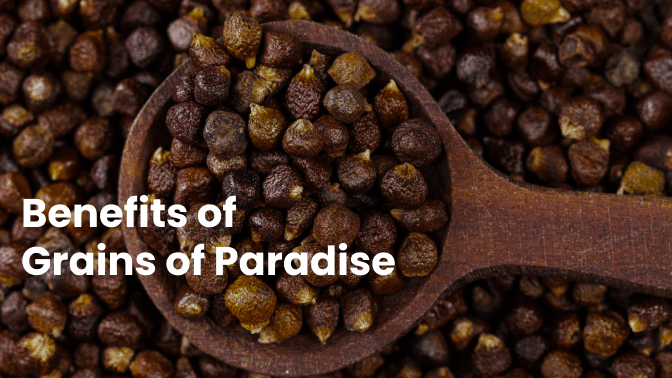Aframomum melegueta, also known as grains of paradise, is a herb that is frequently used in West African and North African cooking. This herb has long been used in traditional therapy and is renowned for its health advantages. We’ll talk about the dietary value and health advantages of grains of paradise in this piece, as well as some culinary ideas.
Nutritional Content of Grains of Paradise
Fiber, vitamins, and nutrients are abundant in grains of paradise. One spoonful of grains of paradise has 5% of the daily fibre recommendation, 4% of the iron recommendation, and 1% of the calcium recommendation. They also have trace quantities of copper, potassium, and magnesium.
Read Also: Power Foods for Strong and Healthy Bones: A Guide to Backbone Strength food
Health Benefits of Grains of Paradise
- Anti-Inflammatory Properties: Grains of paradise contain compounds that have anti-inflammatory properties. Inflammation is a natural response to injury or infection, but chronic inflammation can lead to a number of diseases, including heart disease, diabetes, and cancer. Grains of paradise may help reduce inflammation in the body and protect against these diseases.
- Improved Digestion and Gut Health: Grains of paradise have been used in traditional medicine to aid digestion and promote gut health. Studies have found that grains of paradise can increase the production of digestive enzymes and reduce inflammation in the gut. This can help alleviate digestive issues like bloating, gas, and constipation.
- Potential Anti-Obesity Effects: Grains of paradise may have anti-obesity effects by increasing the body’s energy expenditure and reducing fat accumulation. A study found that consuming grains of paradise extract for four weeks resulted in a significant increase in energy expenditure and a decrease in body fat.
- Potential Anti-Cancer Effects: Grains of paradise contain compounds that have been shown to have anti-cancer effects. One study found that an extract of grains of paradise inhibited the growth of human breast cancer cells.
- Cardiovascular Health Benefits: Grains of paradise may have cardiovascular health benefits by improving blood flow and reducing inflammation in the arteries. A study found that consuming grains of paradise extract for eight weeks resulted in a significant reduction in arterial stiffness.
- Anti-microbial properties: Grains of paradise contain compounds that have anti-microbial properties. Studies have found that grains of paradise can inhibit the growth of certain bacteria, including those that cause foodborne illnesses.
- Pain relief: Grains of paradise may have pain-relieving properties. One study found that an extract of grains of paradise reduced pain and inflammation in mice.
- Brain function: Grains of paradise may have cognitive and neuroprotective effects. A study found that consuming grains of paradise extract for six weeks improved memory and learning in rats. Another study found that grains of paradise extract protected against brain damage in mice with Alzheimer’s disease.
How to Use Grains of Paradise in Cooking
Grains of paradise have a warm, spicy flavor with hints of citrus and pepper. They can be used in a variety of dishes, including stews, soups, and marinades. Grains of paradise are also a great addition to baked goods like gingerbread and fruit cakes.
Here’s a recipe for a simple grains of paradise spice blend:
- 2 tablespoons grains of paradise
- 2 tablespoons black peppercorns
- 1 tablespoon coriander seeds
- 1 tablespoon cumin seeds
Grind the spices together in a spice grinder or mortar and pestle. Use the spice blend to season chicken, beef, or vegetables.
Precautions and Potential Side Effects
Grains of paradise are generally safe when consumed in small amounts as a spice in cooking. However, consuming large amounts of grains of paradise or taking supplements may cause side effects like stomach upset and allergic reactions.
Here are some precautions and potential side effects to consider when consuming grains of paradise:
- Allergic reactions: Some individuals may be allergic to grains of paradise. Allergic reactions may include itching, swelling, difficulty breathing, and anaphylaxis in severe cases.
- Stomach upset: Consuming large amounts of grains of paradise may cause stomach upset, including bloating, gas, and diarrhea.
- Interactions with medications: Grains of paradise may interact with certain medications, including anticoagulants and blood pressure medications. It’s important to consult with a healthcare provider before consuming grains of paradise if you are taking medication.
- Pregnancy and breastfeeding: There is limited research on the safety of grains of paradise during pregnancy and breastfeeding. It’s best to avoid consuming grains of paradise in large amounts during these times.
- Low blood sugar: Grains of paradise may lower blood sugar levels. Individuals with diabetes or hypoglycemia should monitor their blood sugar levels closely when consuming grains of paradise.
Overall, it’s important to consume grains of paradise in moderation and to consult with a healthcare provider before taking supplements or consuming large amounts of this spice.
Conclusion
The multipurpose flavour grains of paradise has a number of health advantages. To give flavour and nutrients to a variety of foods, they can be used. Including grains of paradise in your diet may help you lose weight, better your metabolism, reduce inflammation, and fend off illnesses like cancer and heart disease. However, before taking significant doses of grains of paradise, as with any vitamin or plant, it’s crucial to speak with a healthcare professional.
